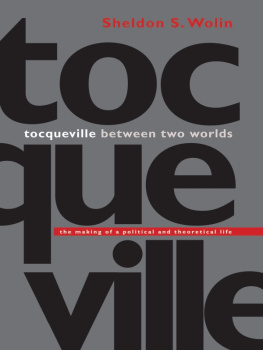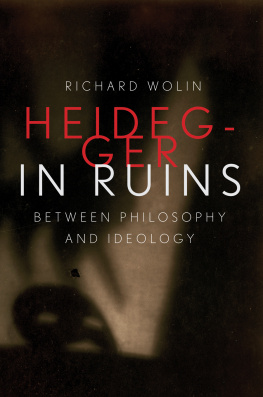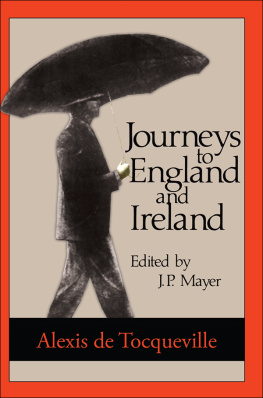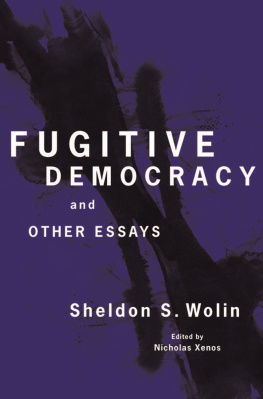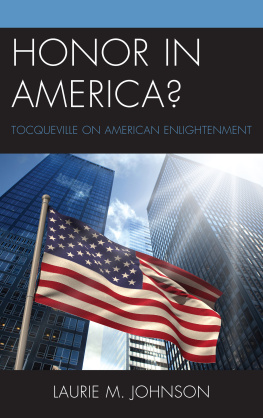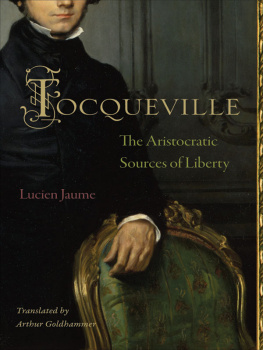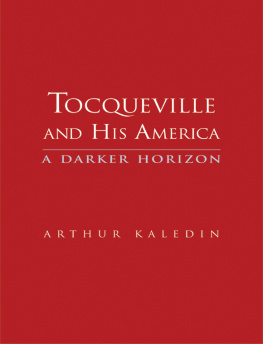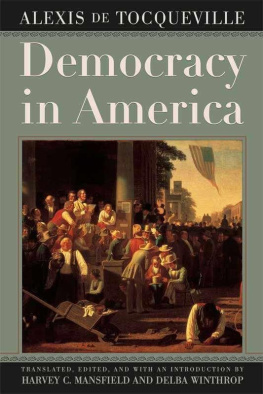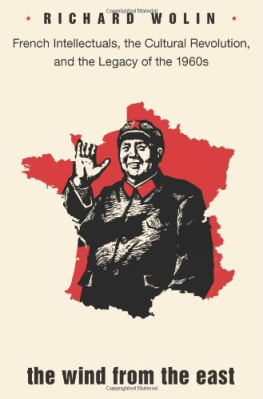Wolin - Tocqueville Between Two Worlds
Here you can read online Wolin - Tocqueville Between Two Worlds full text of the book (entire story) in english for free. Download pdf and epub, get meaning, cover and reviews about this ebook. year: 2008, publisher: Princeton University Press, genre: Politics. Description of the work, (preface) as well as reviews are available. Best literature library LitArk.com created for fans of good reading and offers a wide selection of genres:
Romance novel
Science fiction
Adventure
Detective
Science
History
Home and family
Prose
Art
Politics
Computer
Non-fiction
Religion
Business
Children
Humor
Choose a favorite category and find really read worthwhile books. Enjoy immersion in the world of imagination, feel the emotions of the characters or learn something new for yourself, make an fascinating discovery.
Tocqueville Between Two Worlds: summary, description and annotation
We offer to read an annotation, description, summary or preface (depends on what the author of the book "Tocqueville Between Two Worlds" wrote himself). If you haven't found the necessary information about the book — write in the comments, we will try to find it.
Wolin: author's other books
Who wrote Tocqueville Between Two Worlds? Find out the surname, the name of the author of the book and a list of all author's works by series.
Tocqueville Between Two Worlds — read online for free the complete book (whole text) full work
Below is the text of the book, divided by pages. System saving the place of the last page read, allows you to conveniently read the book "Tocqueville Between Two Worlds" online for free, without having to search again every time where you left off. Put a bookmark, and you can go to the page where you finished reading at any time.
Font size:
Interval:
Bookmark:
TOCQUEVILLE BETWEEN TWO WORLDS

Copyright 2001 by Princeton University Press
Published by Princeton University Press, 41 William Street,
Princeton, New Jersey 08540
In the United Kingdom: Princeton University Press, 3 Market Place,
Woodstock, Oxfordshire OX20 ISY
All Rights Reserved
Library of Congress Cataloging-in-Publication Data
Wolin, Sheldon S.
Tocqueville between two worlds : the making of a political and theoretical life / Sheldon S. Wolin.
p.cm.
Includes bibliographical references and index.
eISBN: 978-1-40082-479-3
1. Tocqueville, Alexis de, 18051859Contributions in political science. 2. Tocqueville, Alexis de, 18051859Contributions in democracy. I. Title.
JC229.T8W65 200I
320'.092dc21
[B]00-065207
This book has been composed in Adobe Garamond
Printed on acid-free paper.
www.pup.princeton.edu
Printed in the United States of America
10 9 8 7 6 5 4 3 2 1
For
Arno J. Mayer
 CONTENTS
CONTENTS
 ACKNOWLEDGMENTS
ACKNOWLEDGMENTS
THROUGHOUT the final stages of this volume my friend Arno Mayer has done much to bring this voume to publication. His steady encouragement, wise counsel, tough-minded criticisms, and helpful suggestions have sustained me and contributed greatly to whatever value the work may have. Dedicating it to him is a small measure of my gratitude. The errors that remain are solely my responsibility.
For several useful suggestions and constructive criticisms I am indebted to Thomas Dumm and Roger Boesche and to the anonymous reviewer for Princeton University Press.
I want to thank the staff of Princeton University Press for its many courtesies and competent editorial advice. Thanks to Ann H. Wald for her early support of the manuscript and special thanks to Ian Malcolm for his help and encouragement throughout.
My principal source for Tocquevilles writings is the Oeuvres compltes, edited by J.-P. Mayer et al. (Paris: Gallimard, 1951). I have cited it as OC. Limited use is made of the Oeuvres compltes dAlexis de Tocqueville, edited by Gustave de Beaumont (Paris: Michel Lvy Frres, 186066). I have cited it as OC (B).
 INTRODUCTION
INTRODUCTION
ALEXIS DE TOCQUEVILLE has become a fixture in contemporary American political discourse, both within the academy and outside. Arguably there have been only two classics of American political theory, The Federalist Papers and Democracy in America. It is safe to say that today Tocquevilles masterpiece is invoked more often in support of some interpretation of present-day American politics than is the Federalist, even though the latter is commonly represented as the thinking of the Founding Fathers. While the Federalist is typically cited to shed light from the past on the present, as in current appeals to the intentions of the Framers, Democracy in America is summoned not only to interpret the past and present but to augur the future.
Accordingly, I have tried to present a Tocqueville who is not so firmly in the French intellectual and political context of his times as to be irrelevant to ours. Scarcely a week passes without some quotation from Democracy inAmerica appearing in the popular media or in literary reviews. Although John Rawls may provide the common reference point for academic philosophers and Michel Foucault for postmodern literary theorists, Tocqueville may well be the more substantial presence in the public philosophy current in the media and in the rhetoric of politicians. To reflect on present-day American politics invites reflection on Democracy in America and vice versa.
Unlike Karl Marx, Tocqueville serves as a unifying rather than a divisive symbol, his magistral status owing much to the consensual function he has been made to perform. Interpreters have created a certain Tocqueville, one who slips easily into the main dialogue of American politics between self-designated liberals and conservatives, with each camp claiming him as its own. To the one he is a liberal conservative who values freedom as well as property rights; to the other he is a conservative liberal who is alert to the dangers of too much democracy and who commiserates with the burdens borne by political elites, not the least of which is the periodic invasion of the political realm by the masses. Both sides assume that Democracy in America equals Tocquevilles theory; that a book about America is synonymous with a book about the United States; and that whatever Tocqueville ascribed to democracy applied to the United States. Each of these assumptions is, as later pages show, either wrong or in need of significant qualification.
Throughout this volume I have tried to keep three principal concerns in mind: first, to present a conception of what Tocqueville understood by political theory, how he experienced and practiced it, and how he tried to combine the theoretical life with the career of a politician; second, to examine his conception of democracy as both a political and a theoretical project; and, third, to show that Tocquevilles writings and actions were preoccupied with the emergence of what would later be called the politics of modernity. I have projected his treatment of these concerns backward by relating them to his theoretical predecessors, particularly to Montesquieu, Rousseau, the Federalist, and Burke; and I have compared his ideas with those of certain of his contemporaries, like Marx and Saint-Simon. In chapters 1 and 2 I have tried to place these concerns in a historical context in order to emphasize the theoretical and practical challenges posed by the virtually simultaneous emergence of modern democracy and what I have called modern power. They are, I believe, the indispensable context for an appreciation both of Tocquevilles achievement and of its failures.
The diverse character of Tocquevilles numerous writings, many of them unpublished during his lifetime, poses formidable questions about which of these, or all of them together, represents Tocquevilles theory. Is the theory of Democracy in America to be considered the same as Tocquevilles theory? Such questions may seem Alexandrian, yet they point to the difficulties in applying the same notion of theory to all of his major works, each of which on its face is strikingly different from the others. Recent commentators have argued that the differences between the first and second installments of Democracy are so marked that it should properly be read as two distinct volumes. Even if one were able to resolve satisfactorily questions about the intellectual unity of Democracy, a more complicated problem concerns the theoretical and political character of Tocquevilles two late masterpieces, neither of which is ordinarily treated as a theoretical work and only one of which is considered to be political in intention. Souvenirs, a work that Tocqueville withheld from publication during his lifetime, is commonly classified as part autobiography, part memoir of the revolution of 1848. The Old Regime and theRevolution is widely esteemed as a classic of historical writing and often reputed to be the work of a detached man who, having been forced to retire from politics, discovered the scholarly rewards of archival research. Its reputation has made it forbidden territory to the political theorist. Although there are subtle, even deliberate continuities between
Next pageFont size:
Interval:
Bookmark:
Similar books «Tocqueville Between Two Worlds»
Look at similar books to Tocqueville Between Two Worlds. We have selected literature similar in name and meaning in the hope of providing readers with more options to find new, interesting, not yet read works.
Discussion, reviews of the book Tocqueville Between Two Worlds and just readers' own opinions. Leave your comments, write what you think about the work, its meaning or the main characters. Specify what exactly you liked and what you didn't like, and why you think so.

